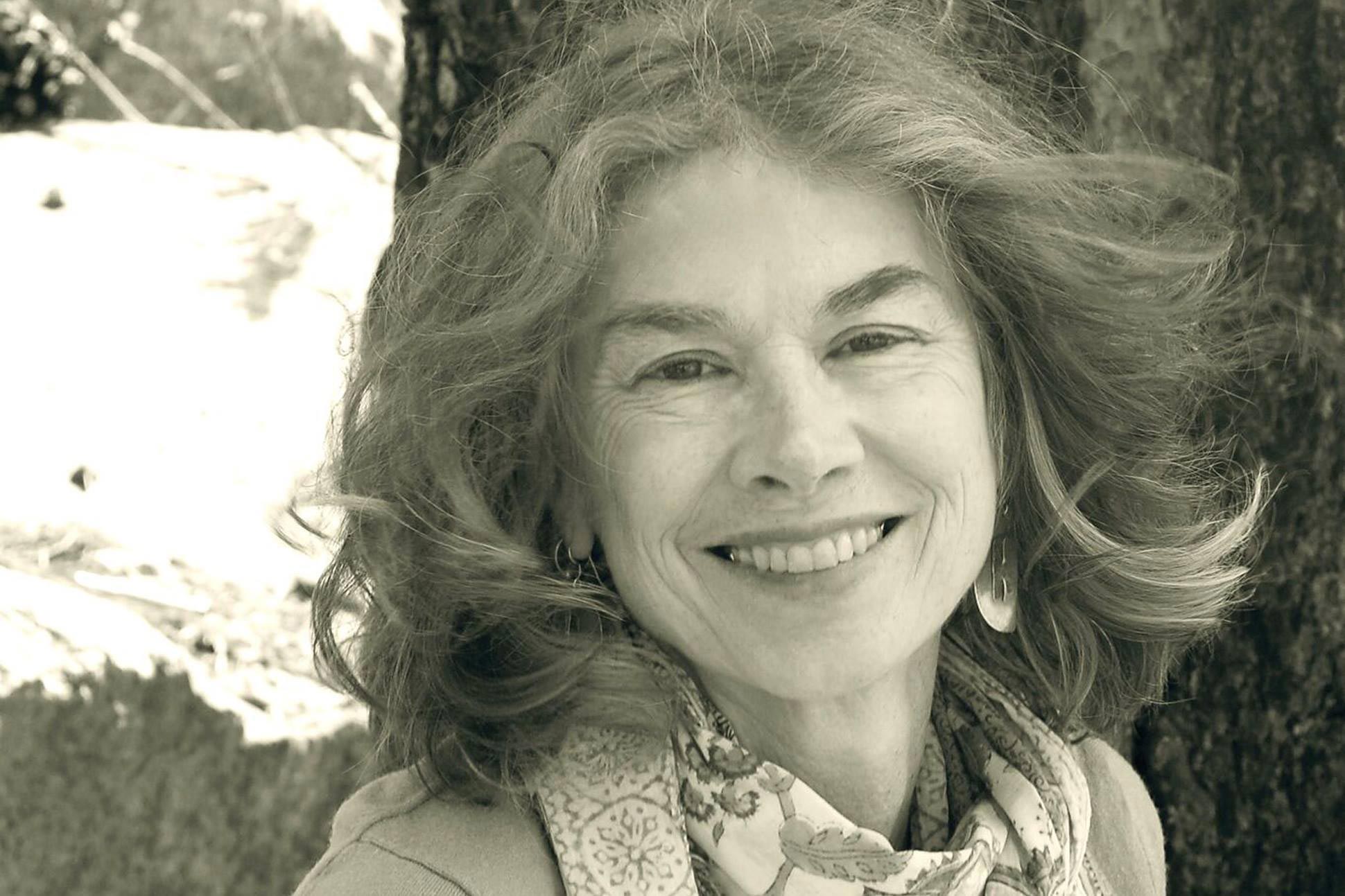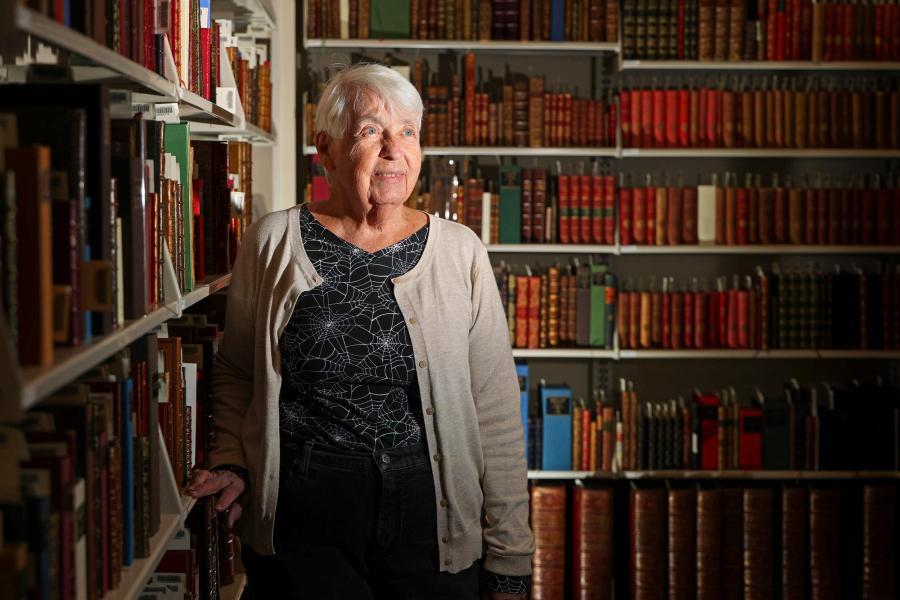Hillman also will hold one-on-one meetings online with students about their poems, be available for office hours and visit several classes, too.
Born and raised in Tucson, Arizona, Hillman has decades of experience writing poetry and teaching. She has lived and worked in the San Francisco Bay area for more than 40 years. Over her 10 volumes of poetry, she has practiced different forms and styles, paying attention to the natural world and humanity’s place in it.
Among her books, four of them follow themes of the elements of earth, air, water and fire: “Cascadia,” “Pieces of Air in the Epic,” “Practical Water” and “Seasonal Works With Letters on Fire,” the latter winning the 2014 international Griffin Poetry Prize. Her most recent collection of poems, “Extra Hidden Life, Among the Days, published in 2018, received the Northern California Book Award for Poetry. She has been listed by Poets & Writers as one of “50 of the Most Inspiring Authors in the World.”
A chancellor of the Academy of American Poets, she has taught at several places and currently holds an endowed professorship at Saint Mary’s College in California.
“I am honored beyond measure to be given the opportunity that the Kapnick Writer position offers,” Hillman wrote in an email, adding her thanks to creative writers, the English Department and the University for inviting her. “I hope to share some of my knowledge and that we can make something together in this challenging time.”
The Kapnick Distinguished Writer-in-Residence Program, made possible by a gift from the Kapnick family, began in 2015. In the tradition of William Faulkner’s legendary residencies on Grounds in 1957 and 1958, the program brings writers of international stature to Charlottesville for extended stays to teach and engage with the UVA student body, both at the graduate and undergraduate levels, and to leave a lasting mark on the literary community.
UVA Today reached out to Hillman to find out more about her writing ideas and her view that this is “a golden age for poetry.”
Q. How do you describe a “poetic toolkit”?
A. What I mean by that is a little “kit” for survival for the average reader – things that poetry can offer if you’re suffering. I was thinking of poetic skills as things that might be useful, not just for poets, but for others as well, and for people interested in literary arts or arts in general. It is really hard to be a poet; poets are usually sensitive, focused on emotions – but it is just as hard for anyone, at any job, to keep your spiritual power intact in a shallow, materialistic culture.
I think the qualities we use for reading and writing poetry can help us live.
In my lectures, I’ll be sharing some examples of poems I admire. I have some concrete things to say about poetic craft. I also mean for the talks to help emerging poets, some things I wish people had told me when I was in school, although some of them do in fact come out of my poetic training, because I had some great teachers, including the poet Charles Wright.
Q. How did you come up with the idea of the six M’s for your public talks?
A. I decided to start with metaphor and metonymy because they are two concepts that interest me. Most people know what a metaphor is – it’s the comparison [or] association of two things that are unlike in a figure of speech – “Last Tuesday was a river trout,” “the internet is his opium den.”
Metonymy is another type of trope [figure of speech]; metonymy literally means “change of name,” from the Greek. It’s a substitution of one linguistic expression for another that’s related to it, and it’s a little more “to the side” than a metaphor is. For example – I’ll be referring to this in my talk – baseball is full of metonymic expressions; a baseball player who plays in the outfield can be referred to as a “glove.” This type of metonymy is also called “synecdoche” – using a part for the whole. It’s not really the glove that is playing out in left field, it’s the guy wearing the glove. But metonymy is bigger than that. I’ll be talking about how one of my interests in this dynamic duo, metaphor and metonymy, was revived by thinking about how metaphor and metonymy are really good to think about together within a poem.
Q. Have you been thinking of these qualities of poetry for awhile, not just during the pandemic?
A. Yes, I decided to talk about things that have interested me in a lifetime of poetic practice. I started by thinking I’d just talk about metaphor and metonymy, then was thinking about meaning and mystery as another dynamic duo; that talk will include a justification of – and help for – reading challenging poems and making sense out of them; I’ll talk some about work with trance. My final talk will be on magic and morality, in which I’ll discuss some political poems, and some of my relationship to political activism and to the moral qualities in certain poems.
Q. When did you start writing poetry? What keeps you continuing to write?
A. I started writing poetry when I was 9. I just fell in love with it very early. My Southern grandmother was an English teacher and gave me a volume of [John] Keats when I was 11 and I went nuts over it. I read the King James Bible, especially the “middle” books, the Psalms and Song of Solomon, as much for the sound of it as anything, and thought the Elizabethan pacing of the English was magical. My dad gave me Edna St. Vincent Millay – Lucille Clifton and I used to talk about how she was the woman poet we fell in love with earliest. I guess poetry just “took” early for me, the certain sounds of certain language in my brain.
My parents were very supportive when I started writing. My mother always strongly encouraged my writing; she grew up in Brazil and read a lot of poetry as a child. She is still fluent in Portuguese – she is 96 now and when she was in her late 80s, we translated together a book by a Brazilian poet, Ana Cristina Cesar, so Mom had her first publication at age 90. My two brothers have really supported my writing; both are very articulate and brilliant guys who read a lot.
Writing and reading poetry keeps yielding and yielding more and more life, even when life is hard, as it is now in the pandemic. If you’re a poet, there is always something new to be invented with words.
- Brenda Hillman
I continue to write because I love poetry so much and I love thinking through problems in the intricate way poetry affords. Writing and reading poetry keeps yielding and yielding more and more life, even when life is hard, as it is now in the pandemic. If you’re a poet, there is always something new to be invented with words. My life is inseparable from poetry and the world of literary arts, and, of course, I am lucky to be married to a great poet, Robert Hass.
Q. There has been a lot of discussion about people turning to poetry during the pandemic quarantine. Why do you think this is so? What is it about poetry that seems to appeal to more people during troubling times?
A. It’s not entirely clear to me why some times make the culture call for poetry more than other times. I complain every year that many Best Books of the Year lists do not include books of poetry, even though this beautiful art is thriving and flourishing, with thousands of practitioners writing thousands of incredible lines every day. Then suddenly, when there’s a crisis, a new war, a 9/11, or a pandemic, or when people need a poem for a wedding or a funeral or for a solemn occasion like an inauguration, they look around for poetry. I’m only half-complaining, but I am complaining.
People should relate to poetry on a daily basis. This is a truly golden age for poetry, with much brilliant work being written. There are over a thousand books of poetry published every year, many of them amazing. That is part of what I want to say in my talks.
Poetry, with its compression and its deep relationship to language and to saying things accurately or metaphorically or metonymically or mysteriously, feels as if it comes from a necessary place within us. Not all poetry, of course. A lot of poetry is playful, anecdotal and even goofy. Some people don’t trust it. But there are millions of poems and many different types of poems; most of them are written by people who really mean what they wrote even if they are using abstract styles. We just have to be trusting and open enough to read them.
Q. Have you been teaching virtually? Is there anything you’ll do with students to mitigate the distance-learning aspect?
A. Yes, I have been teaching on Zoom, and it certainly has some good aspects as well as its limitations.
I was really sad to hear the campus was not opening for visitors; when the pandemic hit, Bob and I had already rented an apartment close by, and I was so looking forward to walking to UVA every day in your beautiful springtime.
The virtual format can help with poetry connections. There are many ways to access poetry, online and to keep posted about what is going on in the art at any level. Read “Poem-a-Day” from Academy of American Poets. Talk about a poem with your friends, with a friend or one of the children in your life. Bob and I read a poem each day online with our 10-year-old grandson Leon over the summer; he really started liking poetry!
But we just have to reach deep in ourselves and make a community with this absolutely odd but lucky format. I never would have thought I’d be teaching on anything like Zoom when I first began doing workshops, and now I think there is a kind of strange intimacy possible. I plan on giving the students as much as I can with my available energy. I can’t wait to talk to them about their poetry and poetic lives, to listen to what challenges they are facing and to read their lines and stanzas!
Zoom is hard, but when I think of how lucky we are to have it, I really am very grateful.
Public Events with Brenda Hillman
- Feb. 10: Metaphor and Metonymy
- Feb. 17: Meaning and Mystery
- Feb. 24: Magic and Morality
Register once for all three talks, which begin at 7 p.m., here.
April 7: Poetry reading, 7 p.m. Register for the reading here.










